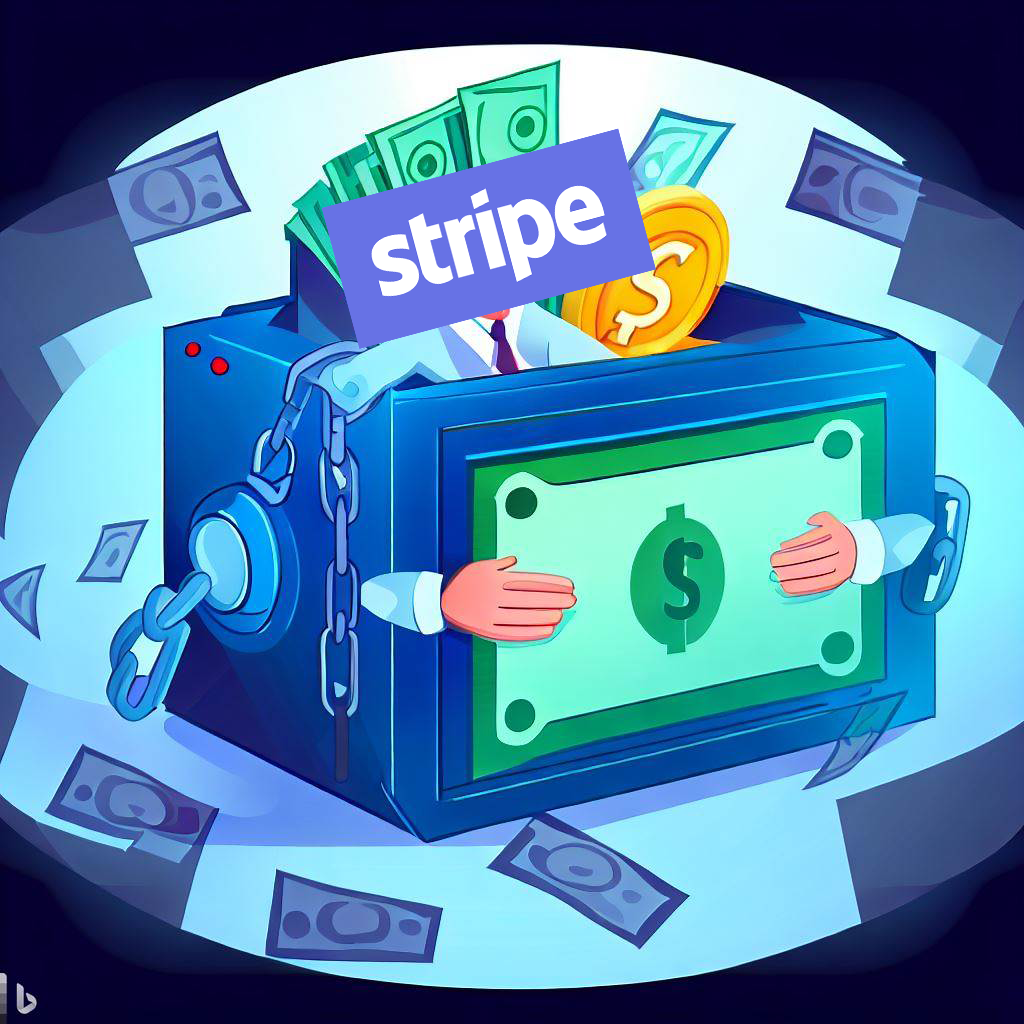
Is Stripe Holding Money STILL? A Merchant’s Guide to Getting Your Money Back
Apr 19, 2023 4 minutes
Welcome, Stripe merchants! As you navigate the world of online payments, you may have encountered the frustrating experience of having your funds temporarily held by Stripe. It’s a common issue that can be both confusing and concerning for those who rely on timely access to their revenue.
That’s why we’ve created this comprehensive guide to help you better understand Stripe’s fund holding policies, and to provide you with tips for preventing and managing holds.
In this blog post, we’ll explore the reasons behind Stripe holding funds and offer advice on how to ensure a smoother payment experience for both you and your customers. Whether you’re a seasoned merchant or new to the world of online payments, this guide is designed to empower you with the knowledge you need to confidently manage your Stripe account.
Understanding Stripe’s Fund Holding Policies
What are the reasons Stripe holds funds?
As a Stripe merchant, it’s essential to understand why Stripe may holds funds. Knowing the reasons behind these holds can help you prevent and address them more effectively. Let’s examine the most common causes:
- Account verification: When you first create a Stripe account, you’ll need to verify your identity and ecommerce business information. If Stripe has any concerns or needs additional information during this process, they may hold your funds temporarily until everything is confirmed and resolved.
- Risk assessment: Stripe continuously monitors transactions to protect both merchants and customers from fraudulent activity. If they detect unusual patterns, your chargeback ratio gets too high, or suspect potential fraud, they may place a hold on your funds while they investigate the situation further.
- Suspicious activity: If Stripe identifies transactions that seem suspicious or violate their terms of service, they may hold your funds as a precautionary measure. This could include unusually high sales volume, chargeback rates, or a sudden influx of disputes.
How does Stripe’s policy compare to PayPal’s?
It’s worth noting that Stripe isn’t the only payment services provider (PSP) that may hold funds. PayPal, for example, has similar policies in place to protect their users. While the specific triggers for holds may vary between the two companies, the overarching reasons are similar: to ensure a safe and secure environment for online transactions.
Understanding that fund holds are not exclusive to Stripe can help put things into perspective and make them feel like less of a targeted issue while also raising your awareness that companies similar to Stripe may put you in the same position—without funds.
How do Stripe’s policies affect merchants?
Holds can impact cash flow, hinder your ability to fulfill orders, and strain relationships with suppliers and customers. By understanding the reasons behind Stripe’s fund holding policies, you’ll be better equipped to take proactive steps to minimize the chances of encountering a hold and ensure a smoother Stripe payment experience for all parties involved.
In the most extreme cases, Stripe holding funds can lead to a total loss in business. I.e., you would no longer have a small business to run because you have no funds to support it nor a credit card processing company to accept transactions.
How to Prevent and Manage Stripe Holds
No one wants to deal with the inconvenience of having their funds held. Fortunately, there are several steps you can take to minimize the likelihood of encountering holds and to manage them effectively if they do occur. Let’s explore these strategies:
Ensure Your Account is Fully Verified
Make sure your Stripe account is fully verified by providing accurate and up-to-date personal and business information. This includes submitting required documents, such as tax identification numbers and business registration details. A fully verified account helps build trust with Stripe and reduces the chances of fund holds due to verification issues.
One of the main issues merchants have with Stripe is the complete lack of an underwriting process until you start transacting over $15k/month. Stripe doesn’t give you a merchant account, it only allows you to operate within its own merchant account.
That’s why signing up is so easy. But once your business starts to pick up speed, Stripe has to take a closer look and that, unfortunately, leads to withheld funds.
Establish a Strong Transaction History
A good transaction history demonstrates to Stripe that you’re a responsible and reliable merchant. To build a solid track record, focus on delivering excellent customer service, maintaining a low chargeback rate, and processing payments consistently. This positive history can make Stripe.com less likely to withhold funds in the future.
Provide Accurate and Up-to-Date Business Information
Ensure that your business information on Stripe is always accurate and up to date. This includes your contact information, website URL, bank statements, and a clear description of the products or services you offer. Accurate information allows Stripe to better understand your business and reduces the risk of being flagged for suspicious activity.
Respond Promptly to Customer Disputes and Chargebacks
If a customer dispute or chargeback arises, it’s crucial to respond promptly and professionally. Addressing these issues in a timely manner can help resolve them more quickly and minimize the potential for fund holds. Be sure to maintain clear communication with your customers and provide the necessary documentation to Stripe to support your case.
You should also use a 3rd-party chargeback monitoring system to help if you see that chargebacks are the leading cause of frustration in your startup business. The cost of the service will cancel out in just a few days compared to the cost of paying chargeback and Stripe fees and refunds.
Communicate with Stripe during a Hold
If you do find yourself facing a fund hold, it’s essential to maintain open and effective communication with the Stripe support team. We have an entire post on communicating with Stripe to get your funds back. If you follow it closely, you will get your payout timely.
Alternatives to Stripe for Business Owners
While Stripe is a popular choice among online merchants, it’s not the only credit card payment processor available—and there are certainly safer options than Stripe.
If you’re considering exploring alternatives to Stripe, it’s essential to evaluate the pros and cons of each option to find the one that best fits your business needs. Let’s take a look at some factors to consider and alternative payment processors to Stripe:
Other Payment Service Options
There are several other payment processing companies that you can consider as alternatives to Stripe, each with its unique features, pricing structures, and policies. Some popular options include:
- PayPal: A widely-used payment processor that supports a vast range of currencies and countries. PayPal offers a variety of payment solutions for businesses of all sizes.
- Square: A user-friendly payment processor that focuses on seamless integration with point-of-sale systems, e-commerce platforms, and mobile payments.
- Braintree: A payment gateway owned by PayPal that offers advanced payment solutions for businesses, including fraud protection and customizable checkout experiences.
- Merchant Account: There are many merchant service providers—DirectPayNet being one of them. What we provide is a specified account designed solely for your business model, so you will never have to deal with surprise holds, freezes, or shut downs.
This is a good point to mention that Shopify Payments is the same payment provider as Stripe. So there is no need for you to consider this as an alternative.
Evaluate the Pros and Cons of Alternative Payment Processors
Before making a switch, carefully weigh the pros and cons of each payment processor. Consider factors such as:
- Pricing structure: Analyze the fees associated with each processor, including transaction fees, monthly fees, and any additional charges.
- Integration and compatibility: Determine how easily the payment processor can be integrated into your existing website, e-commerce platform, or point-of-sale system.
- Customer support: Assess the quality and availability of customer support, as this can be crucial when dealing with payment issues or fund holds.
- Payment methods: Choose a processor that supports the payment methods preferred by your customers, such as credit cards (e.g. Visa), ACH, debit cards, or direct bank account transfers.
- Scalability: Opt for a payment processor that can grow with your business, offering features and pricing structures that suit your needs as you expand.
Need a payment processor that fully supports your business? There’s only one solution for you.
Understanding the reasons behind Stripe holding funds and taking proactive measures to prevent and manage such situations are crucial for a smooth and successful payment experience. By staying informed, maintaining open communication, and following best practices, you can effectively navigate the world of online payments and create a seamless experience for both you and your customers.
If you’ve been burned one too many times by Stripe and you need an account that will stay up and running as long as your high-risk business exists, get in touch with us. DirectPayNet provides high-risk merchant accounts to online businesses of all types, connecting them with a payment processor that truly backs their business.




